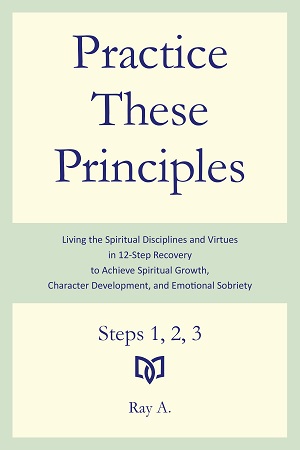
"Taking a closer look at the principles now, we can distinguish two large and predominant groups. In the Western or Judeo-Christian spiritual tradition, these have come to be widely known as disciplines and virtues. Together they comprise principles of the spiritual life governing our relationship with God, and principles of the moral life governing our relationship with our fellows. We can look at the virtues as the goals or ends, the spiritual qualities, character traits, and mental and emotional dispositions to which we aspire; at the disciplines as the means through which we strive toward them.
This is not to say that disciplines and virtues are the only principles at work in AA as laid out in its basic texts. There are others, and we shall have occasion to see what they are and how they work. One of these we have briefly alluded to, for “First Things First” is not just a slogan but itself a key principle of the spiritual life. Yet these other principles do not coalesce into distinct and significant groups. Moreover, they are functionally related to the disciplines and virtues as the core principles through which the Steps work.
Their centrality notwithstanding, discipline and virtue are not part of the vocabulary of AA experience. The terms are used in the literature, but no systematic attempt is made to identify and discuss the principles under these rubrics. Instead, we will find that the principles overall are accorded a variety of labels which, while good, are nevertheless general and indistinct: such names as assets, concepts, precepts, qualities, standards, strengths, tenets, themes, tools, traits, values, or even just practices.
This is not surprising, given the aversion to systematization already alluded to. This aversion persists. Many of us prefer generalization, vagueness, and imprecision when it comes to the Steps, the principles, and how AA works. We see this as safeguarding our individuality and leaving us free to choose how to work the program. The more generic or malleable a term, the more we can give it our own personal meaning. AA bends over backwards to accommodate us, even as it tells us that the main purpose of the Big Book is “To show other alcoholics precisely how we have recovered [italics in the original].”9
Yet, words matter. They are the tools that enable us to think. If they are general and imprecise, so will our thinking be. We will fall short of the needed clarity and understanding, the principles will remain vague, and our practice will lack substance, consistency, and direction.
Disciplines and virtues are concepts that have developed over the course of more than two millennia within a variety of secular and religious traditions as people have tried to understand the principles underlying human behavior, thought, and emotion, and to apply that understanding to the question of what constitutes the good life, and how to pursue it. More than just words, the terms embody a rich tradition of thought and practice that underlies much of the AA program and from which we can continue to benefit as we seek to understand and work those principles in our recovery."
– From "Disciplines and Virtues," pp. 11–13
For more PTP123 Excerpts, please click on link.